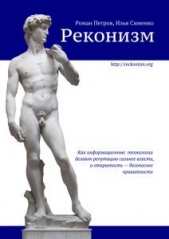Реконизм. Как информационные технологии делают репутацию сильнее власти, а открытость — безопаснее п

Реконизм. Как информационные технологии делают репутацию сильнее власти, а открытость — безопаснее п читать книгу онлайн
Эта книга — о влиянии информационных технологий на социальную эволюцию. В ней показано, как современные компьютеры и Интернет делают возможным переход к новой общественной формации, в основе которой будут лежать взаимная прозрачность, репутация и децентрализованные методы принятия решений. В книге рассмотрены проблемы, вызванные искажениями и ограничениями распространения информации в современном мире. Предложены способы решения этих проблем с помощью распределённых компьютерных систем. Приведены примеры того, как развитие технологий уменьшает асимметричность информации и влияет на общественные институты, экономику и культуру.
Внимание! Книга может содержать контент только для совершеннолетних. Для несовершеннолетних чтение данного контента СТРОГО ЗАПРЕЩЕНО! Если в книге присутствует наличие пропаганды ЛГБТ и другого, запрещенного контента - просьба написать на почту [email protected] для удаления материала
140. Фромм, Эрих. "Человек одинок" Trans. Р. Облонская. Иностранная литература 1 (1966): 230-33.
141. Шрайэгг, Г., Носс, К. "Изжила ли себя организационная структура?" Проблемы теории и практики управления 4 (1994): 78-83.
142. Юдковски, Е. Систематические ошибки в рассуждениях, потенциально влияющие на оценку глобальных рисков. Новые технологии и продолжение эволюции человека? Трансгуманистический проект будущего. Москва, 2008.
143. Arrow, Kenneth J., Hurwicz, L. Decision Making under Ignorance. Oxford: Basil Blackwell, 1972.
144. Arrow, Kenneth Joseph, Debreu, Gérard. Existence of an Equilibrium for a Competitive Economy. Chicago: Cowles Commission for Research in Economics, University of Chicago, 1954.
145. Arrow, Kenneth Joseph. Social Choice and Individual Values. New York: Wiley, 1963.
146. Baron, Jonathan. Thinking and Deciding. Cambridge, UK: Cambridge UP, 2000.
147. Benkler, Yochai. The Wealth of Networks: How Social Production Transforms Markets and Freedom. New Haven, [Conn.: Yale UP, 2006.
148. Bernays, Edward L. Propaganda. New York: H. Liveright, 1928.
149. Bishop, Michael A., Trout, J. D. Epistemology and the Psychology of Human Judgment. New York: Oxford UP, 2005.
150. Branscomb, Anne W. Who Owns Information?: from Privacy to Public Access. New York, NY: Basic, 1994.
151. Brendon, Piers. The Decline and Fall of the British Empire: 1781-1997. London: Jonathan Cape, 2007.
152. Cremer, Helmuth, Pestieau, Pierre. "Piracy Prevention and the Pricing of Information Goods" CEPR Discussion Paper 5556 (March 2006).
153. Darwin, Charles Robert. The Origin of Species: Complete and Fully Illustrated. New York: Gramercy, 1979.
154. Diamond, Peter A., Mirrlees, James A. Optimal Taxation and Public Production. [United States]: American Economic Association, 1971.
155. Drucker, Peter F. "The Next Information Revolution" Forbes ASAP [New-York] 24 Aug. 1998.
156. Ferguene, Ameziane, Latouch, Serge. Socialisme Et Developpement: Essai Sur Les Limites De L'accumulation Socialiste Autocentree a La Peripherie. S.l.: S.n., 1987.
157. Heywood, Andrew. Political Ideologies: an Introduction. New York, NY: Worth, 1998.
158. Kuhn, Alfred. The Study of Society; a Multidisciplinary Approach. [London]: Tavistock Publications, 1963.
159. La CIA, Castro Y Bahía De Cochinos: La Llegada De Castro Al Poder. GUERRA ETERNA. Web. http://www.guerraeterna.com/archives/2005/07/la_cia_castro_y.html.
160. Lambert-Mogiliansky, Ariane, Majumdar, Mukul, Radner, Roy. "Petty Corruption: A Game-theoretic Approach" International Journal of Economic Theory 4.2 (2008): 273-97.
161. Machiavelli, N. Il Principe. Giunti Editore, 2004. Biblioteca Ideale Giunti. Web. 10 Dec. 2011.
162. Marx, Karl. Economic and Philosophic Manuscripts of 1844. London: Lawrence and Wishart, 1970.
163. McConnell, Campbell R., Stanley, L. Brue. Economics: Principles, Problems, and Policies. Boston, Mass. [u.a.: McGraw-Hill/Irwin, 2008.
164. McLuhan, Marshall. The Gutenberg Galaxy: the Making of Typographic Man. [United States]: University of Toronto, 1965.
165. McLuhan, Marshall. Understanding Media; the Extensions of Man,. New York: McGraw-Hill, 1964.
166. Pyдык, Николай Борисович. "Экономический эффект "влипания"" Элитариум: Центр дистанционного образования. 30 Nov. 2005. Web. 11 Dec. 2011. http://www.elitarium.ru/2005/11/30/jekonomicheskijj_jeffekt_vlipanija.html.
167. Reis, Harry T., Sprecher, Susan. Encyclopedia of Human Relationships. Thousand Oaks, CA: Sage Publications, 2009.
168. Jin, Byoungho, Park, Jin Yong, and Kim, Jiyoung. "Cross-cultural Examination of the Relationships among Firm Reputation, E-satisfaction, E-trust, and E-loyalty" International Marketing Review 25.3 (2008): 324-37.
169. Kreps, D., Wilson, R. "Reputation and Imperfect Information" Journal of Economic Theory 27.2 (1982): 253-79.
170. Rothschild, Michael, Stiglitz, Joseph. "Equilibrium in Competitive Insurance Markets: An Essay on the Economics of Imperfect Information" The Quarterly Journal of Economics 90.4 (Nov., 1976): 629-49.
171. Russell, Bertrand. A History of Western Philosophy. New York, NY: Simon and Schuster, 1972.
172. Service, Robert. A History of Modern Russia: from Nicholas II to Vladimir Putin. Cambridge, MA: Harvard Univ. Pr., 2005.
173. Shane, Scott A. "The Effect of Cultural Differences in Perceptions of Transaction Costs on National Differences in the Preference for Licensing" MIR: Management International Review 32.4 (1992): 295-311. Web. 11 Dec. 2011. http://www.jstor.org/stable/40228115.
174. Simon, Herbert A. Administrative Behavior; a Study of Decision-making Processes in Administrative Organization. New York: Macmillan, 1957.
175. Smith, Adam. An Inquiry into the Nature and Causes of the Wealth of Nations. Vol. 3. Dublin: Whitestone, 1776.
176. Stigler, George J. "The Economics of Information" Journal of Political Economy 69.3 (1961): 213.
177. Thompson, John M. Revolutionary Russia, 1917. New York: Scribner, 1981.
178. Vickrey, William S., Arnott, Richard. Public Economics: Selected Papers by William Vickrey. Cambridge: Cambridge UP, 1996.
179. Wallerstein, Immanuel. The Modern World-system. New York: Academic, 1974.
180. Williamson, Oliver E. Markets and Hierarchies: Analysis and Antitrust Implications : a Study in the Economics of Internal Organization. New York: Free, 1983.
181. Williamson, Oliver E. The Economic Institutions of Capitalism: Firms, Markets, Relational Contracting. New York: Free, 1985.
182. Williamson, Oliver E. "The Theory of the Firm as Governance Structure: From Choice to Contract" Journal of Economic Perspectives 16.3 (2002): 171-95.
183. Biggart, Nicole Woolsey, Delbridg, Rick. Systems of Exchange, The Academy of Management Review, Vol. 29, No. 1 (Jan., 2004), pp. 28-49, Published by: Academy of Management, Stable URL: http://www.jstor.org/stable/20159007
























